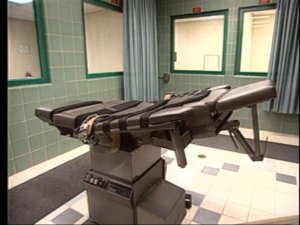A federal judge in Arkansas issued an injunction Saturday halting the execution by lethal injection of nine inmates, saying the prisoners are likely to succeed in demonstrating the state’s proposed method of execution is unconstitutional.

The injunction represents the latest legal setback in Arkansas’ attempt to execute the inmates — eight of whom were originally set to be put to death by the end of April. One man’s execution had not been scheduled yet.
A court must now decide whether the method of execution constitutes cruel and unusual punishment. Arkansas Attorney General Leslie Rutledge said she plans to appeal the decision.
In her order Saturday, US District Judge Kristine Baker said there was “a significant possibility” the inmates will succeed in challenging the execution protocol. She said the prisoners were entitled to challenge the execution method on grounds it “creates a demonstrated risk of severe pain.”
“The threat of irreparable harm to the plaintiffs is significant,” she wrote.
Baker also said the state denied the inmates access to their attorneys.
“The court is mindful of the fact that the state of Arkansas has not executed an inmate since 2005, despite consistent support for capital punishment from (Arkansas residents) and their elected representatives,” she wrote.
The families of the victims “waited decades to receive some closure for their pain,” Baker noted. “By this Order, that day is delayed yet again.
“These thoughts weigh heavily on the court, but the court has a responsibility to uphold the Constitution. After hearing the evidence … the court is compelled to stay these executions.”
John Williams, an assistant federal public defender who represents some of the death row prisoners, called on “state officials to accept the federal court’s decision, cancel the frantic execution schedule, and propose a legal and humane method to carry out its executions.”
“The unnecessarily compressed execution schedule using the risky drug midazolam denies prisoners their right to be free from the risk of torture,” he said in a statement, referring to the drug used to render inmates unconscious before they are given two other drugs that paralyze and kill them.
The state’s schedule of eight executions using midazolam between April 17 and 27 has been condemned by capital punishment opponents in the United States and abroad. Attorneys for the inmates said no state has attempted to conduct executions at the pace proposed by Arkansas in at least half a century.
Arkansas planned to execute the eight before its supply of lethal injection drugs expires at the end of the month.
Another judge blocks executions
Another judge in Arkansas effectively stopped the executions Friday night, citing concerns over the lethal injection method.
Pulaski County Circuit Judge Wendell Griffen issued a temporary restraining order stopping the state from using the drug of vecuronium bromide for lethal injections. The supplier of the drug argued the medication wasn’t supposed to be used for capital punishment.
Rutledge, the state attorney general, has filed an emergency petition to overturn the Griffen’s order.
Drug distributor McKesson Medical-Surgical Inc. argued vecuronium bromide was intended only for medical purposes, not executions, and that the Arkansas Department of Correction “misled” the company when it purchased the drug, according to a court brief.
“ADC (the Arkansas Department of Correction) personnel used an existing medical license, which is to be used only to order products with legitimate medical uses, and an irregular ordering process to obtain the vecuronium via phone order with a McKesson salesperson,” the brief said.
McKesson is asking the Department of Correction to return 10 vials of the drug.
Two other drug companies, Fresenius Kabi USA and West-Ward Pharmaceuticals Corp., filed a brief in US District Court for the Eastern District of Arkansas arguing contracts prohibit their products from being used in executions, which run “counter to the manufacturers’ mission to save and enhance patients’ lives.”
Controversial plan on executions
Two of the eight executions planned for this month already had been blocked in separate proceedings.
A federal judge on April 6 blocked the execution of Jason McGehee. The Arkansas Parole Board had earlier voted to recommend that McGehee’s death sentence be commuted to life without parole, and the judge ruled McGehee’s April 27 execution date would not have given the board enough time, as required by law, to notify the governor of its recommendation.
Earlier Friday, the Arkansas Supreme Court also blocked the execution of Bruce Ward.
Attorneys argued that Ward, 60, should not be executed because he’s mentally incompetent. He’s been on death row since 1990 for strangling a woman in a convenience store bathroom, CNN affiliate KARK-TV in Little Rock reported.
A report by a Harvard Law School initiative suggests six of the eight men Arkansas plans to execute by the end of April are not mentally fit for the death penalty, including Ward.
According to the report, Ward told a forensic psychiatrist in 2010 that he hears voices, he gets revelations directly from God and he will “walk out of prison to great riches and public acclaim.” He said he’s been visited in prison by his deceased father and “resurrected dogs.”
In March, Gov. Asa Hutchinson announced his controversial plan to execute eight inmates in a little more than a week, starting April 17.
Defense attorneys argued that midazolam does not effectively keep those being executed from experiencing a painful death.
“If midazolam does not adequately anesthetize plaintiffs, or if their executions are ‘botched,’ they will suffer severe pain before they die,” Baker wrote in her order Saturday.
Ward was one of two inmates set to die Monday. Don William Davis was also scheduled to be executed then.















